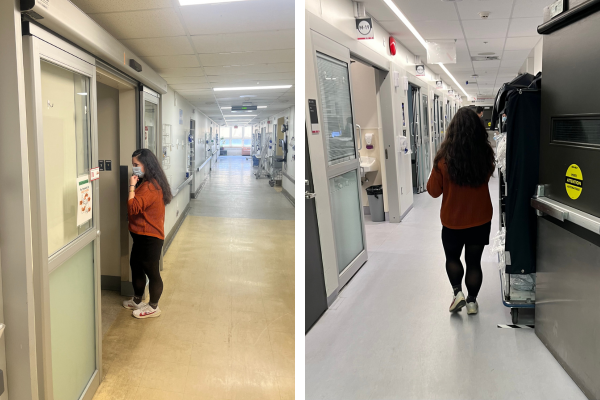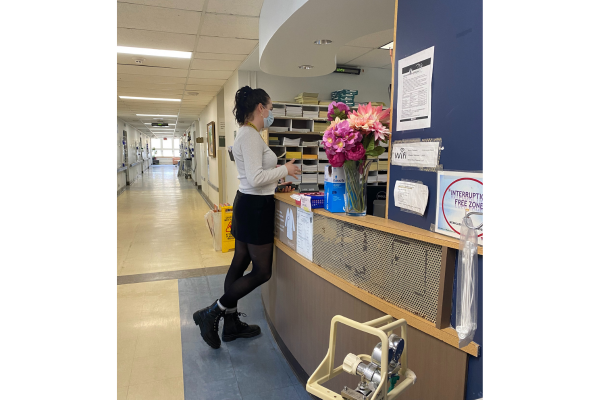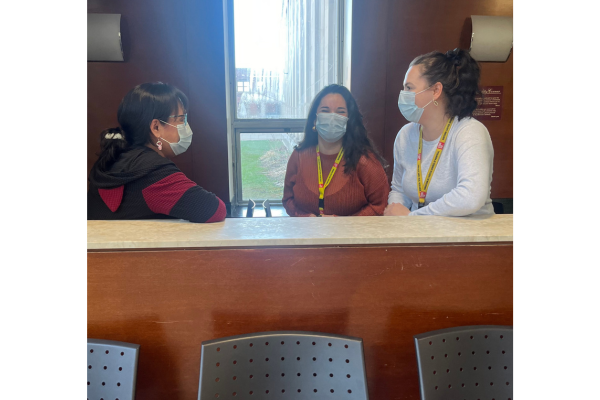Building bridges: MGH program cultivates support and trust with Indigenous patients
“More and more Indigenous patients are starting to hear about our program and the services that are there to support them. It makes us happy to know they may be less anxious when seeking medical treatment at the MUHC.” Camille Panneton and Sidonie Laurier are Indigenous Liaison Agents. They took a few minutes out of their busy day to talk about the program that is approaching its first anniversary.
How does the Indigenous Liaison Program work?
The program officially got off the ground across the province last July following recommendations from the Viens Commission on cultural safety. Liaison Agents were deployed in 10 Montreal healthcare institutions – including the MUHC. Supervised by the MUHC Partnership Office, it is intended to strengthen ties and build trust with Indigenous communities by providing culturally sensitive care in the health network. Liaison Agents act as advocates for patients in addition to providing comfort and support. They also offer guidance and information on relevant and respectful practices to the clinical teams. “We're not here to step on anyone’s toes or tell them what to do. The teams have their own systems, ways of working and protocols to follow,” states Camille. “We are here to accompany and support them in their work with Indigenous patients. We are available for questions, concerns or extra support,” she adds.


Ensuring Indigenous patients feel safe and heard
Eighty percent of the patients Camille and Sidonie meet are Cree and Inuit from Northern Quebec. Most begin their journey in the Emergency Department at the Montreal General Hospital. “Given the lack of healthcare services in northern communities, some patients stay at the MUHC for several months. They don’t always have a loved one able to stay with them in Montreal and can become isolated from their culture and their community,” explains Sidonie. “We try to follow those patients more closely, sometimes visiting them every day. There is a relationship that develops slowly over time.”
Continuity of care is pivotal to the duo. “Our role is to be the liaison between the different professionals involved in patient care. We try to identify the needs of the patient and ensure they feel safe and heard,” says Camille. “We don’t have a set list of services. We start by listening. Sometimes it involves providing access to certain foods or helping to connect with family or community members.” Inuit and Cree interpreters with the Ullivik and Wiichiituwiin community organizations assist to overcome any language barriers. “It’s really helpful for my people,” says Siasie Echalook. Siasie is one of three Inuit interpreters employed by Ullivik. She explains her role at the MGH. “Sidonie comes to me, asks me to help her, to go see the patient, especially with elders. I communicate with them, to make Sidonie understand what they need. It is really helping people and they are happy when she asks if they need anything,” she says.

Cultivating a strong foundation
While the program is still in its infancy, word has started to spread – within both the MUHC and the Indigenous communities. Here are some of the projects that have started over the last year:
-
A Welcome Guide for Indigenous patients at the MGH.
-
Building strong relationships between Montreal based community organizations, Indigenous patients and the clinical teams.
-
Collaboration with different MUHC services, i.e. Food Services, Spiritual Care Services, the Ombudsman to respond to specific needs of Indigenous patients and families.
-
Working alongside community organizations to provide Indigenous patients with traditional foods and recipes, when available.
Camille and Sidonie are proud of the headway they’ve made. In the short time the program has existed, both women have developed strong connections with some of the patients, keeping in contact with them months after they’ve left the hospital and returned home.
For more information on the Indigenous Liaison Agents Program or for additional resources, including access to interpreters, send an email to [email protected].
